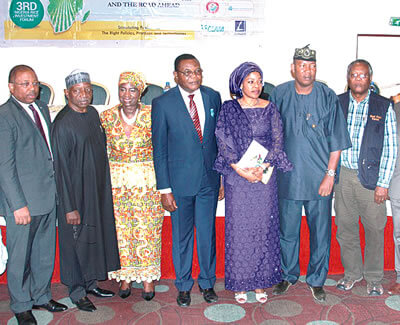Over the months, the astronomical rice in prices of food commodities especially rice had been a cause of concern to many people in Nigeria as the exorbitant cost of food has made the cost of living high for most individuals. Indeed, many have said that the rising cost of food has made life difficult for many as rice which was a common staple in homes before now, has now become food for the rich, adding to the biting effects of the economic recession faced by the country.
In a bid to navigate the country out of this situation, agricultural and economic experts have over time met to seek for techniques of moving the country towards self sufficiency in food production.
The most recent of such gathering is the NEPAD Business Group Nigeria’s recent forum on rice. The group held its 3rd Rice Investment Forum at the Ladi Kwali Hall, Abuja Sheraton Hotel recently.
The two days forum with the theme, 2018 Self Sufficiency in Rice Production: opportunities, challenges and the road ahead to stimulating production with the right policies, practices had participants drawn from federal ministries, the diplomatic corps, department and agencies (MDAs), research institutions, states and local governments, the academia, financial institutions, civil society, international organizations, non-governmental organizations, community based organizations, the organized private sector, professional bodies, small holder farmers, the media and the general public.
370 delegates registered for the forum which had five plenary sessions and 22 paper presentations with interactive question and answer sessions while 3O organizations exhibited different varieties of made in Nigeria rice and other locally fabricated rice processing equipment.
Giving the welcome address, the Chairman of NEPAD group, Mrs. Nike Akande, represented by Mallam Abu Aliu, stressed that the 3rd edition of the Rice Investment Summit was geared to build on the success of the previous editions and highlighted the crucial need for diversification of the economy which rice production could fill.
The Honourable Minister of Agriculture and Rural Development, Chief Audu Ogbeh, represented by Mr. Obinna G. Opara, in his keynote address, expressed delight that Nepad Business Group Nigeria had brought key actors together to chart a way forward for rice production which he described as a critically important staple, spotlighting the Federal Government’s Agric Promotion Policy (APP) which set a target for self sufficiency in rice production for 2018.
He also reeled out implementation strategies for government’s auspicious drive while the challenges to achievement were also mentioned along with a suite of priority actions to surmount the challenges.
The minister lauded the achievements of the Anchor Borrower’s Rice Program. He concluded with words of gratitude for Nepad Business Groups Nigeria’s efforts.
The plenary sessions arrived at various decisions; the need for increase in integrated rice mills, using research and development as an enabler for improved yield, emphasis on key role of seed in the rice value chain, the impact of poor processing on Ofada rice and lack of quality breeder seeds which leads to lack of large scale commercialization of Ofada rice.
The sessions also drew a direct linkage between technology and improved rice yield per hectare, advanced a transparent and effective commodity buy-back scheme as a good practice to boost rice production, advocated the effect of good post-harvest practices and implements, emphasized the importance of standards to the value of the Nigerian rice, emphasized effective agric financing as the rallying point of the rejuvenation of the Nigerian economy and discourages outright ban on importation of rice but called for increased levies and other fiscal measures among many other outcomes.
In closing, Mr. Dosumu Oluwole, the Acting Head, NEPAD Business Group Nigeria expressed appreciation to all who graced the occasion and used the occasion to restate the resolve of the group to continue to intervene and partner with other stakeholders in the rice value chain to help bring transform the economy of Africa.






